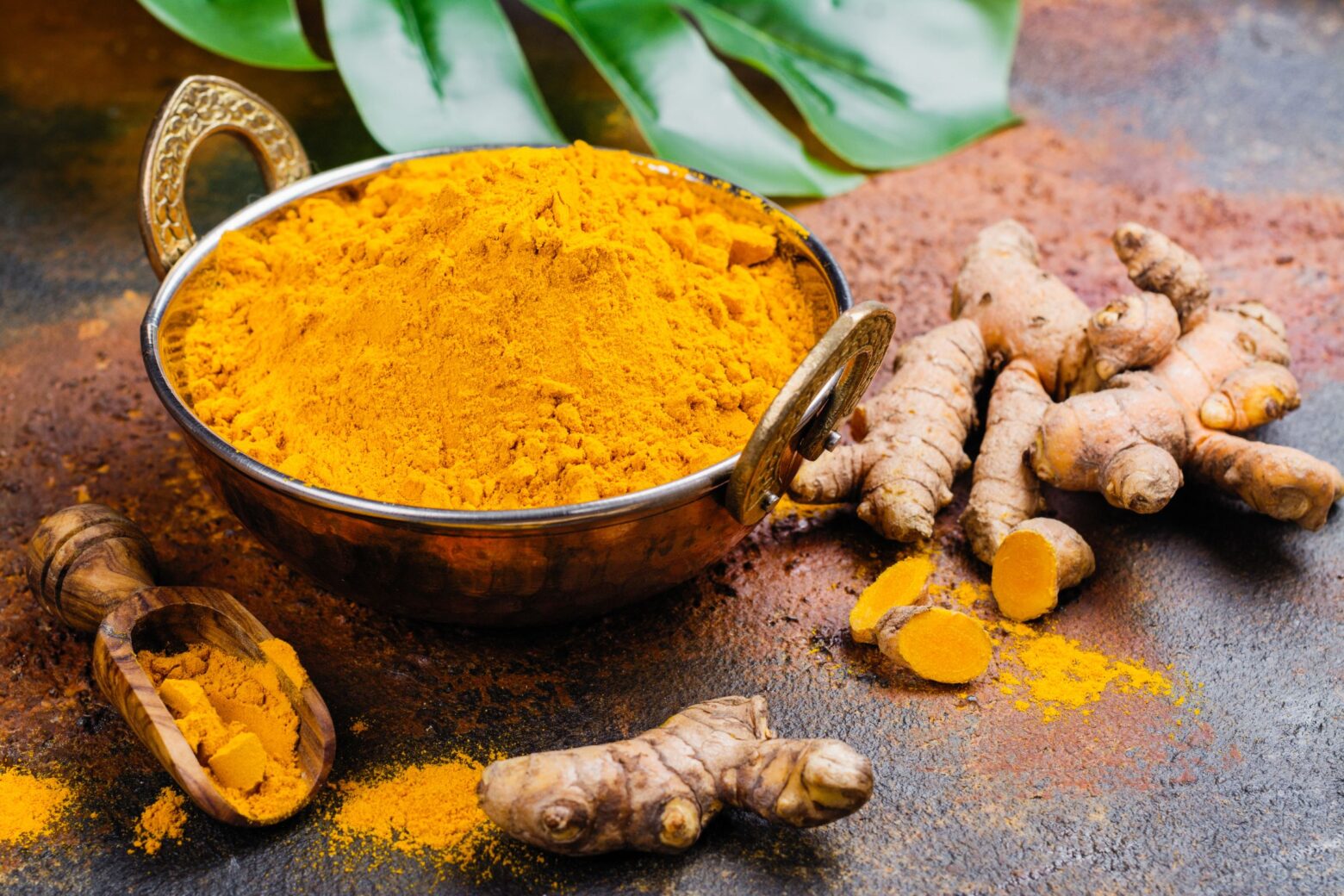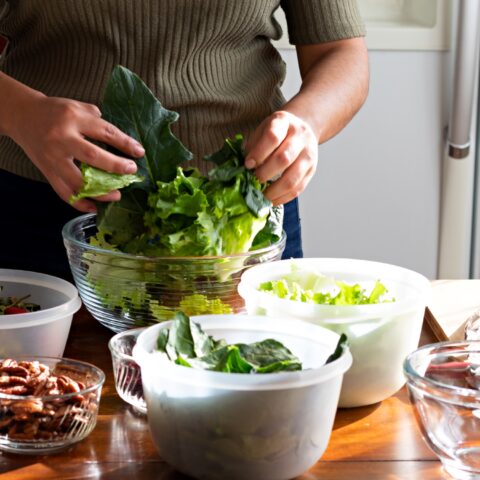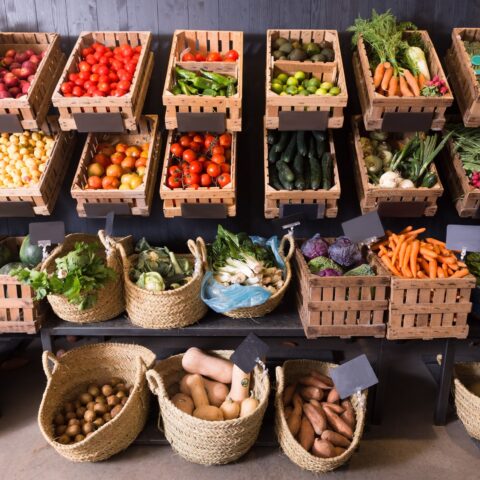Culinary Tips and Benefits of Turmeric

Turmeric is a golden-yellow spice derived from the rhizome (underground stems) of the Curcuma longa plant. It’s long been used in Asian cuisines for its flavor and health benefits. The fresh rhizomes look like ginger root but with bright orange flesh. Ground turmeric spice is made by drying and grinding the rhizomes into a powder. It has a concentrated flavor and is more commonly used in savory dishes.
Nutritional Benefits of Turmeric
Turmeric’s primary active compound, curcumin, is responsible for many of its health benefits. Here are just a few reasons to consume turmeric:
- Antioxidant Power: Curcumin scavenges harmful free radicals and boosts the activity of the body’s own antioxidant enzymes like superoxide dismutase (SOD). The antioxidants from turmeric protect cells from oxidative stress and reduce the risk of chronic diseases. [1]
- Anti-Inflammatory Properties: Chronic inflammation is linked to heart disease, cancer, autoimmune disease, and neurodegenerative conditions. Curcumin is a powerful anti-inflammatory agent that may help reduce chronic inflammation in the body. Research has shown turmeric to be as effective as some anti-inflammatory drugs but without the side effects. [2]
- Cardiovascular Health: Turmeric has been shown to improve the functioning of blood vessel linings, which is critical for regulating blood pressure and clotting. Its anti-inflammatory activity can also help reduce damage to the heart and blood vessels, lowering the risk of cardiovascular disease. [3]
- Immune Health: Turmeric has been shown to help balance the immune system. It can enhance its response to pathogens while also reducing the excessive immune reactions associated with allergies and autoimmune diseases. [4]
- Brain and Mental Health: The curcumin in turmeric may increase a substance called brain-derived neurotrophic factor (BDNF), which protects brain cells and enhances cognitive health. Low levels of BDNF are associated with depression and Alzheimer’s disease. [5,6]
How Turmeric Is Grown
Turmeric root is native to southern Asia, specifically the country of India, which accounts for most of the world’s production. It’s been cultivated in India for thousands of years and is used widely in culinary and medicinal applications. Other major producers include Bangladesh, Indonesia, China, parts of Africa, and even the Caribbean. [7,8]
Turmeric thrives in humid, tropical, and subtropical regions with temperatures between 68°F and 95°F. It does well in well-drained, fertile soils, with consistent moisture. Turmeric is propagated from rhizomes cut into 1- to 2-inch pieces. The best ones to plant are healthy, mature rhizomes with at least one or two buds (eyes). [9]
Turmeric is planted at the start of the rainy season in tropical areas or the springtime in subtropical areas. They’re spaced 6-8 inches apart and 2-4 inches deep in the dirt. During the growing season, turmeric needs additional nutrients from organic fertilizers. It’s typically ready for harvest 7-10 months after planting when the leaves turn yellow and start drying. [10,11]
Harvested rhizomes are boiled or steamed for about 40-60 minutes to remove the odor, gelatinize the starch, and bring out the color. The rhizomes are dried in the sun for up to two weeks until brittle. Then they are polished to remove rough edges and improve the appearance.
Turmeric Cooking Fundamentals
Turmeric, whether fresh or dried, has many uses in cooking. While it’s known for Indian and Thai curries, that’s just the beginning! Turmeric is also an excellent addition to soups, riced cauliflower, eggs, marinades, and even brines for pickling vegetables. It has a warm, earthy, slightly bitter taste. It’s best to use it in small amounts to avoid overwhelming the flavors. About ½ to 1 teaspoon usually suffices.
While it does well in savory dishes, turmeric also works well in certain beverages and baked goods. Sometimes, it’s used with ginger in muffins, scones, or other quick breads to enhance their health benefits. Golden milk is likely the best-known way to use turmeric in beverages. However, it also pairs well in tropically inspired smoothies that include pineapple, mango, or banana.
Selecting and Storing Turmeric
Fresh turmeric should be firm and brightly colored. It should stay refrigerated or stored in moist sawdust to extend its shelf life. Ground turmeric should have a vibrant yellow-orange hue and a potent aroma. Store ground turmeric in a cool, dry, and well-ventilated place.
Turmeric Prep Tips
To prepare fresh turmeric, use a spoon to scrape off the thin skin, similar to how you’d peel fresh ginger. You can leave the skin on if you’re blending or juicing. Chop, slice, or grate fresh turmeric as needed. A microplane grater works well for fine shreds.
Pair turmeric with healthy fats like coconut oil and black pepper to enhance curcumin absorption. Piperine from black pepper may increase absorption by up to 2,000%. [12] Keep in mind that it’s a vibrant orange color and stains easily. Wear gloves and use cutting boards or tools you don’t mind staining.
References
- Khayatan D, Seyed Mehrad Razavi, Zahra Najafi Arab, Hosseini Y, Amirhossein Niknejad, Saeideh Momtaz, et al. Superoxide dismutase: a key target for the neuroprotective effects of curcumin. Molecular and Cellular Biochemistry. 2023 May 11. https://pubmed.ncbi.nlm.nih.gov/37166541/
- Wang Z, Singh A, Jones G, Winzenberg T, Ding C, Chopra A, et al. Efficacy and Safety of Turmeric Extracts for the Treatment of Knee Osteoarthritis: a Systematic Review and Meta-analysis of Randomised Controlled Trials. Current Rheumatology Reports. 2021 Jan 28;23(2). https://pubmed.ncbi.nlm.nih.gov/33511486/
- Usharani P, Mateen AA, Naidu MUR, Raju YSN, Chandra N. Effect of NCB-02, Atorvastatin and Placebo on Endothelial Function, Oxidative Stress and Inflammatory Markers in Patients with Type 2 Diabetes Mellitus. Drugs in R & D. 2008;9(4):243–50. https://pubmed.ncbi.nlm.nih.gov/18588355/
- Wu S, Xiao D. Effect of curcumin on nasal symptoms and airflow in patients with perennial allergic rhinitis. Annals of Allergy, Asthma & Immunology: Official Publication of the American College of Allergy, Asthma, & Immunology [Internet]. 2016 Dec 1;117(6):697-702.e1. Available from: https://pubmed.ncbi.nlm.nih.gov/27789120/
- Xu Y, Ku B, Cui L, Li X, Barish PA, Foster TC, et al. Curcumin reverses impaired hippocampal neurogenesis and increases serotonin receptor 1A mRNA and brain-derived neurotrophic factor expression in chronically stressed rats. Brain Research. 2007 Aug;1162:9–18. https://pubmed.ncbi.nlm.nih.gov/17617388/
- Song JH, Yu JT, Tan L. Brain-Derived Neurotrophic Factor in Alzheimer’s Disease: Risk, Mechanisms, and Therapy. Molecular Neurobiology. 2014 Oct 30;52(3):1477–93. https://pubmed.ncbi.nlm.nih.gov/25354497/
- Prasad S, Aggarwal BB. Turmeric, the Golden Spice [Internet]. Nih.gov. CRC Press/Taylor & Francis; 2011. Available from: https://www.ncbi.nlm.nih.gov/books/NBK92752/
- Turmeric | Description, History, & Uses [Internet]. Encyclopedia Britannica. Available from: https://www.britannica.com/plant/turmeric
- How to Grow and Care for Turmeric [Internet]. The Spruce. Available from: https://www.thespruce.com/turmeric-plant-profile-4779812
- Resources U of C Division of Agriculture and Natural. Turmeric [Internet]. mgsantaclara.ucanr.edu. Available from: https://mgsantaclara.ucanr.edu/garden-help/herbs/turmeric/
- HOSS. Turmeric Growing Guide [Internet]. HOSS. 2024. Available from: https://growhoss.com/blogs/growing-guides/turmeric
- G S, D J, T J, M M, R R, Ps S. Influence of Piperine on the Pharmacokinetics of Curcumin in Animals and Human Volunteers [Internet]. Planta medica. 1998. Available from: https://pubmed.ncbi.nlm.nih.gov/9619120/
Betsy Schroeder
Betsy does research and writing for a few different websites in the natural health field after taking Masters level courses in Nutrition & Functional Medicine through the University of Western States.
More About The Author




